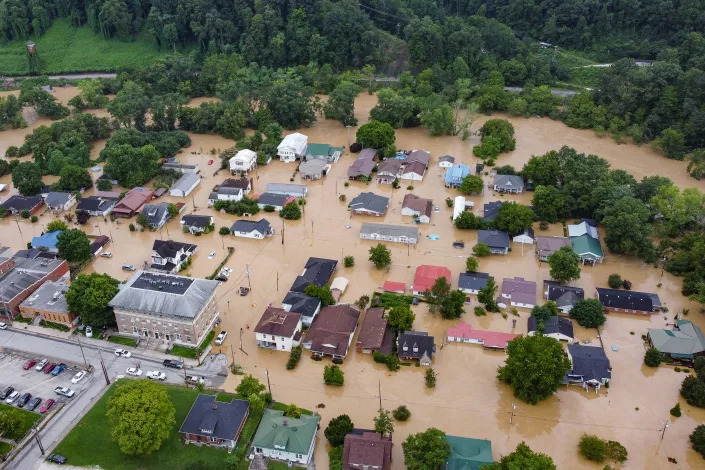Sir Keir Starmer: I will slash ‘nonsense’ bureaucracy in the NHS
Camilla Turner
Sat, 14 January 2023

Writing for The Telegraph, Sir Keir Starmer says the situation for NHS patients is now 'intolerable and dangerous' - Brian Lawless/PA
Sir Keir Starmer has vowed to slash “mind-boggling” NHS bureaucracy, as he said the service must either “reform or die”.
The Labour leader cautioned that “well-meaning reverence” for the health service has “supplanted reality”, adding that it must not be seen as “off limits” for criticism.
He outlined a series of reforms that a Labour government would bring in, which include allowing patients to bypass GPs to make self-referrals to specialists, as well as gradually turning family doctors into direct NHS employees.
It is the first time Sir Keir has publicly backed the proposals, previously mooted by Wes Streeting, the shadow health secretary.
Writing in The Telegraph, Sir Keir said the situation for NHS patients is now “intolerable and dangerous”, adding: “The idea the service is still ‘the envy of the world’ is plainly wrong.”
His remarks - which will be seen as a break from Labour’s traditional veneration of the NHS - come as nurses prepare for a fresh round of strikes on Wednesday and Thursday of this week.
Sir Keir also outlined Labour’s plans to crack down on the “bureaucratic nonsense” that patients encounter every day in the health service.
“Why can’t people with persistent back problems self-refer to physio?” he said. “Why if you notice bleeding do you have to get a GP appointment, simply to get the tests that you then do yourself at home?
“Every patient will have their own experience of these mundane inconveniences and inefficiencies. Across the system and across the country each one adds up, resulting in a mind-boggling waste of time, energy and money, all of which could be better spent.”
The NHS is facing one of its worst winter crises, with medics warning that hospitals are running out of oxygen because of the number of patients being treated in corridors and ambulances.
Heart attack victims were left waiting an average of 90 minutes for an ambulance last month – the worst waiting times on record.
Camilla Turner
Sat, 14 January 2023

Writing for The Telegraph, Sir Keir Starmer says the situation for NHS patients is now 'intolerable and dangerous' - Brian Lawless/PA
Sir Keir Starmer has vowed to slash “mind-boggling” NHS bureaucracy, as he said the service must either “reform or die”.
The Labour leader cautioned that “well-meaning reverence” for the health service has “supplanted reality”, adding that it must not be seen as “off limits” for criticism.
He outlined a series of reforms that a Labour government would bring in, which include allowing patients to bypass GPs to make self-referrals to specialists, as well as gradually turning family doctors into direct NHS employees.
It is the first time Sir Keir has publicly backed the proposals, previously mooted by Wes Streeting, the shadow health secretary.
Writing in The Telegraph, Sir Keir said the situation for NHS patients is now “intolerable and dangerous”, adding: “The idea the service is still ‘the envy of the world’ is plainly wrong.”
His remarks - which will be seen as a break from Labour’s traditional veneration of the NHS - come as nurses prepare for a fresh round of strikes on Wednesday and Thursday of this week.
Sir Keir also outlined Labour’s plans to crack down on the “bureaucratic nonsense” that patients encounter every day in the health service.
“Why can’t people with persistent back problems self-refer to physio?” he said. “Why if you notice bleeding do you have to get a GP appointment, simply to get the tests that you then do yourself at home?
“Every patient will have their own experience of these mundane inconveniences and inefficiencies. Across the system and across the country each one adds up, resulting in a mind-boggling waste of time, energy and money, all of which could be better spent.”
The NHS is facing one of its worst winter crises, with medics warning that hospitals are running out of oxygen because of the number of patients being treated in corridors and ambulances.
Heart attack victims were left waiting an average of 90 minutes for an ambulance last month – the worst waiting times on record.

Sir Keir said the situation for NHS patients is now 'intolerable and dangerous' - PA
Sir Keir warned that “investment alone won’t be enough” to rescue the NHS and said he will tackle “ingrained thinking” among hospital managers to force change and modernisation of the service.
His message is a direct challenge to Rishi Sunak, who has made cutting down NHS waiting list times one of his key priorities as Prime Minister.
On Saturday night, Downing Street announced plans for a major expansion of his "virtual wards" initiative, whereby patients are treated at home as part of efforts to free up hospital beds.
Sir Keir said Mr Sunak’s promise to get waiting lists down is merely the “path of least resistance” and the “stale route to further decline” of the health service.
He described how the model of using doctors as the only “front door” of the NHS is no longer viable, as younger doctors are increasingly put off from taking on the “burdens and liabilities” of running GP practices.
Currently, GPs are self-employed and run their own practices under contracts awarded by the NHS. Sir Keir wants to gradually wind this down and make GPs direct employees of the NHS.
“It’s time for us to think about a new, sustainable system, one that allows GPs to focus on caring for patients rather than the admin that comes with effectively running a small business,” said Sir Keir.
“This would be a big change and it won’t happen overnight. But I am a pragmatist, focused on what works for patients.
“As GPs retire and those contracts are handed back, I want to phase in a new system that sees GPs fairly rewarded within the NHS, working much more closely with other parts of the system.”














